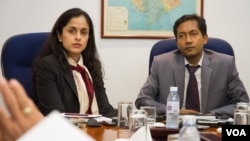The International Monetary Fund expects Cambodia’s economic growth rate to remain stable at around 7 percent this year, while inflation is expected to rise.
The economy is being helped along by the construction and real estate sectors, as well as garment exports, Sonali Jai-Chandra, who led an IMF mission to Cambodia over the last two weeks, told reporters Friday.
But inflation is expected to rise about 2.6 percent by the end of the year, and financial woes in Europe could lead to less imports there of Cambodian garments, which could affect growth, she said.
“The macroeconomic situation and outlook are thus favorable, although there are downside risks,” she said. “A protracted growth slowdown in Europe or a stronger dollar would constrain garment exports. Weaker-than-expected growth in China would have spillovers through the FDI, banking and tourism channels.”
The IMF team suggested the government safeguard macro-financial stability, secure fiscal buffers, and promote competitiveness, diversification and inclusive growth.
“Rapid financial deepening in Cambodia requires careful macro-financial risk management to ensure financial stability,” Jain-Chandra said.
Economist Chan Sophal said external risk management is likely to be difficult, however, though he said Cambodia “can improve local services and production.”
“So what should the government do with the construction and real estate sector risks?” he said. “This is very difficult. As we can see, there is a significant increase of constructions and real estate price. It’s likes a bubble: the price is incredibly increasing and will burst and decrease, like in 2008.”







